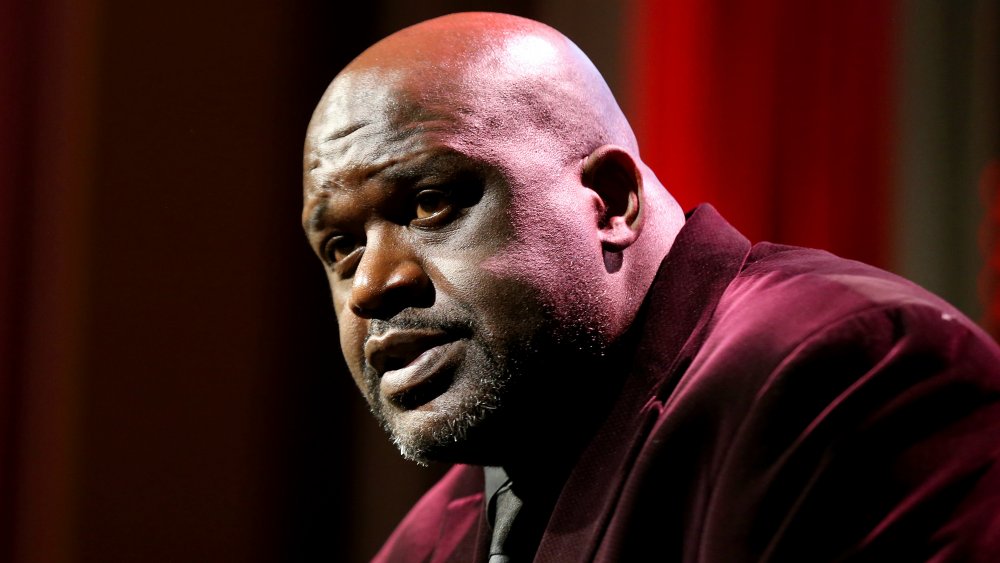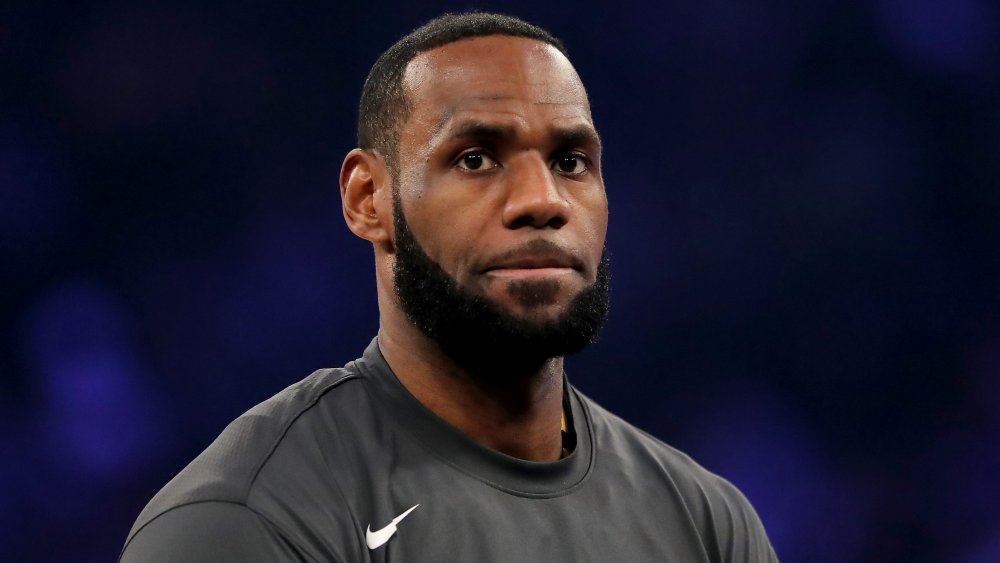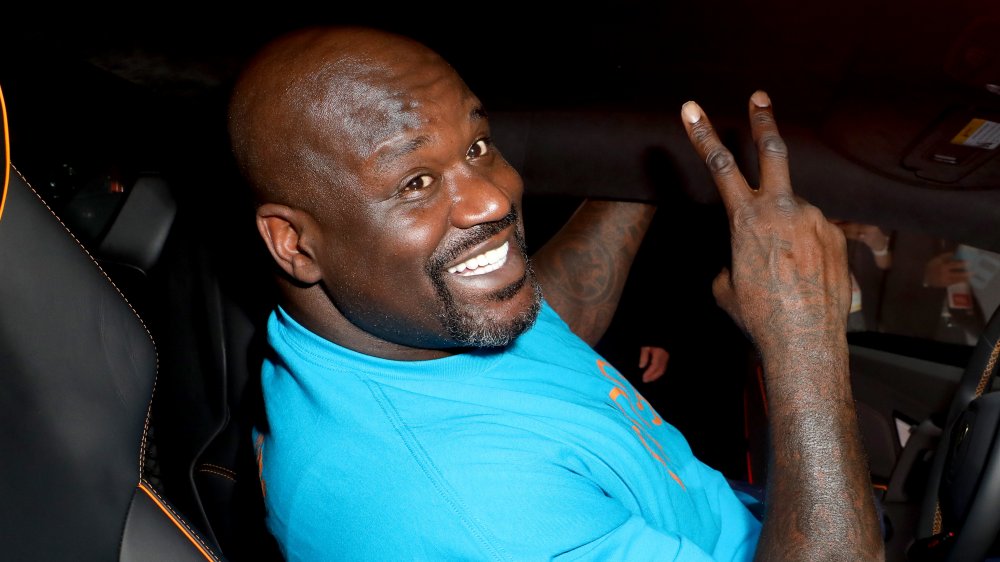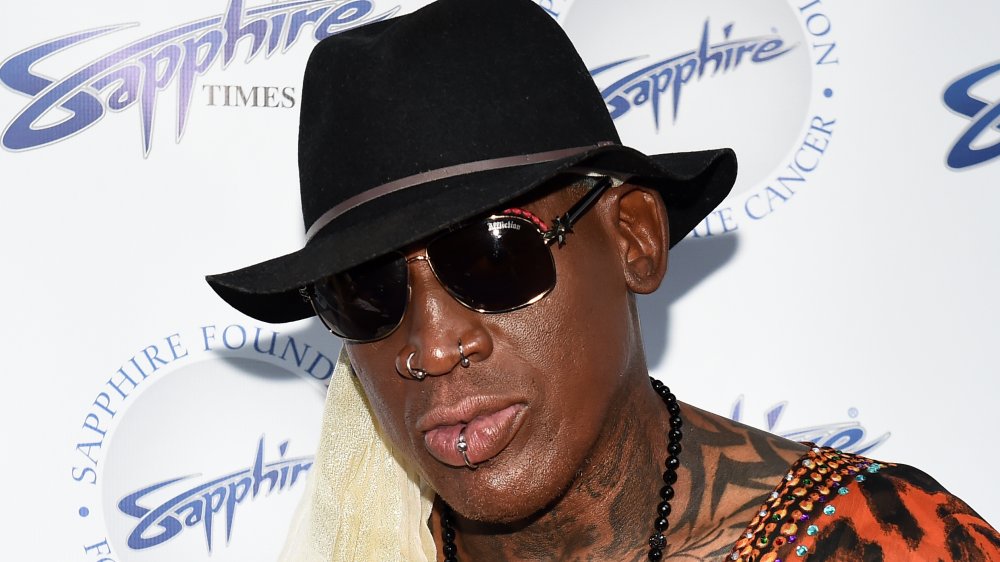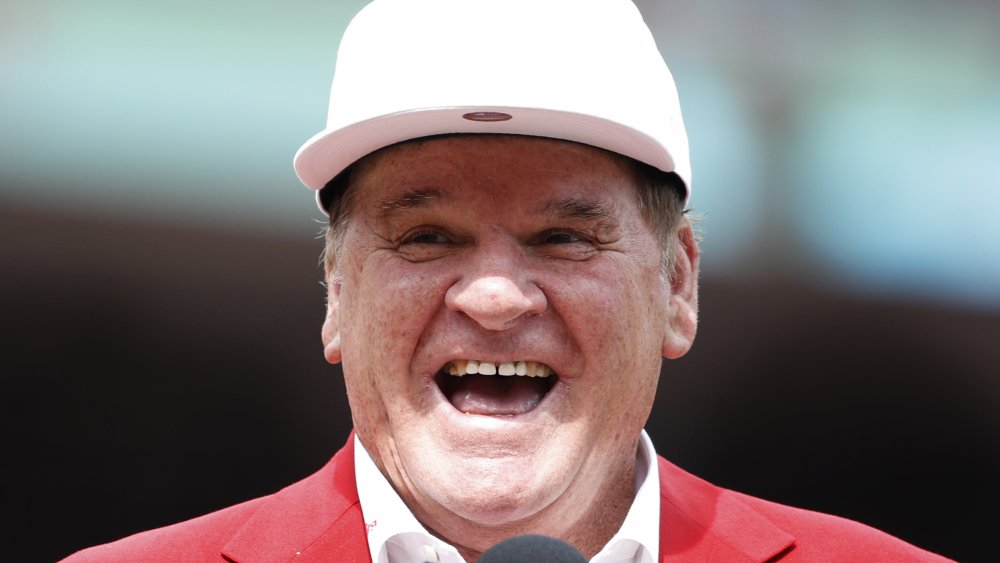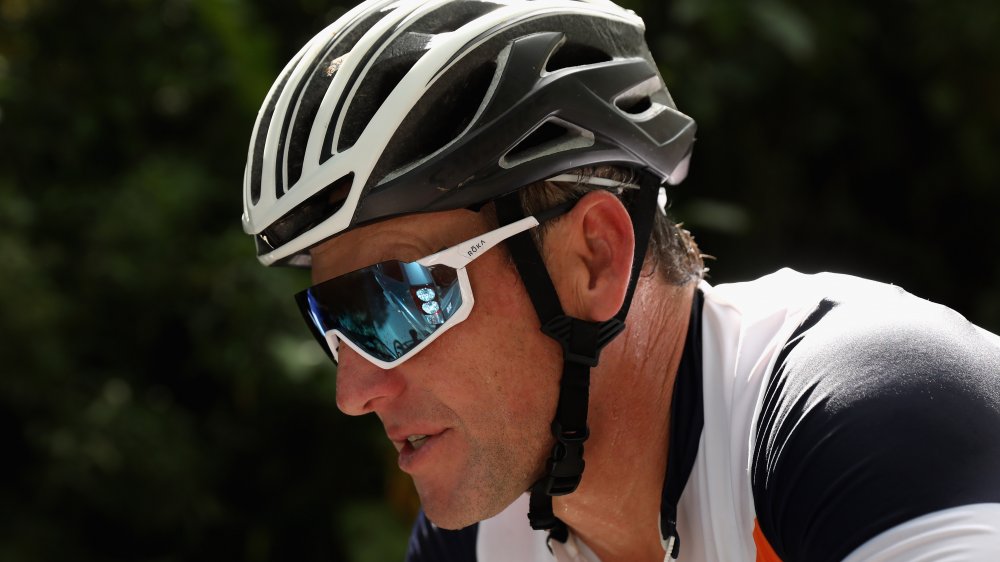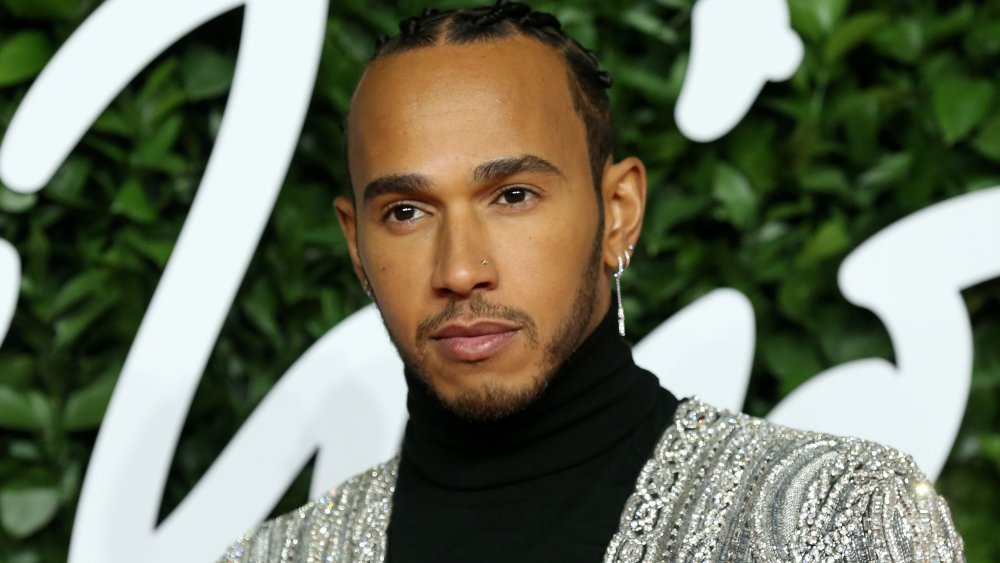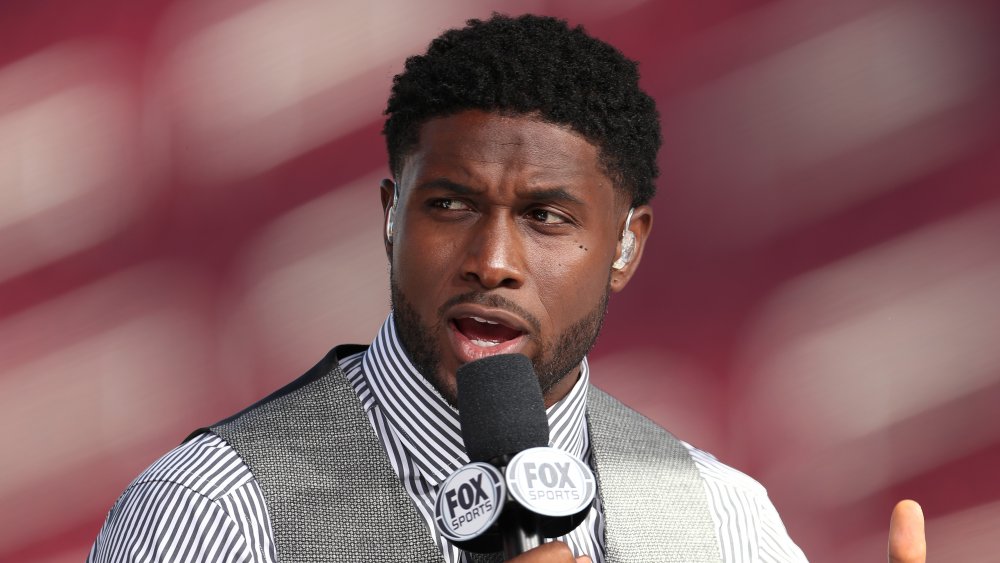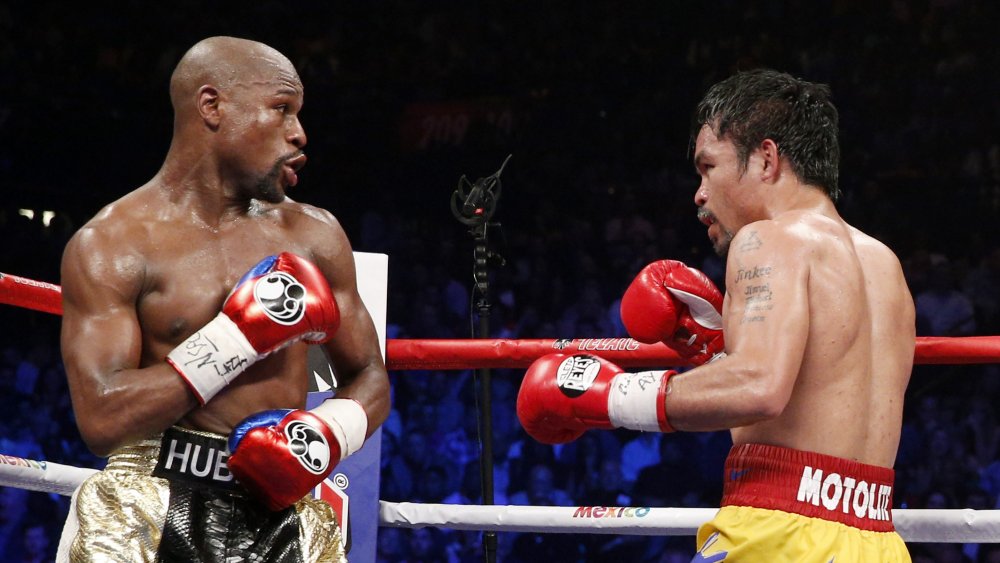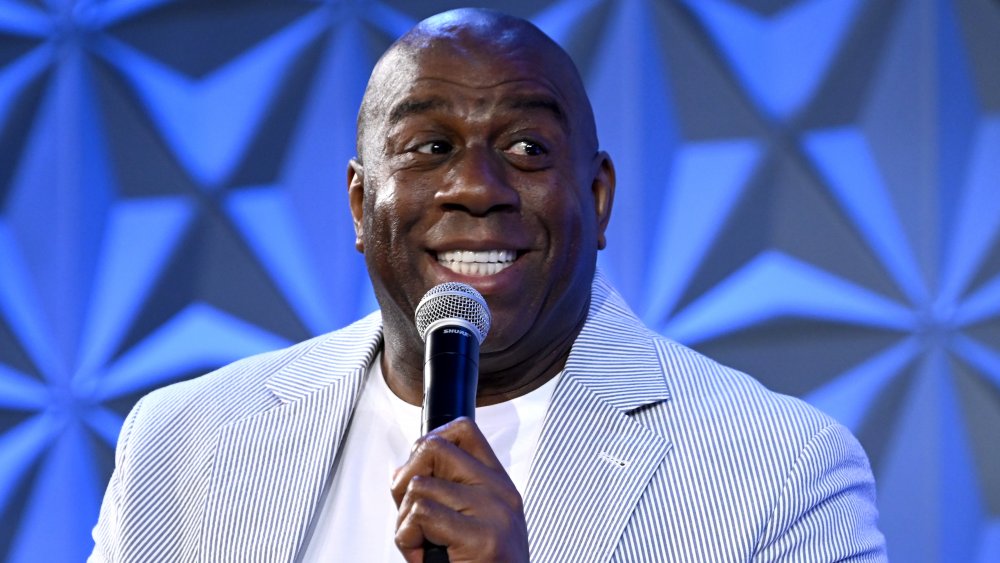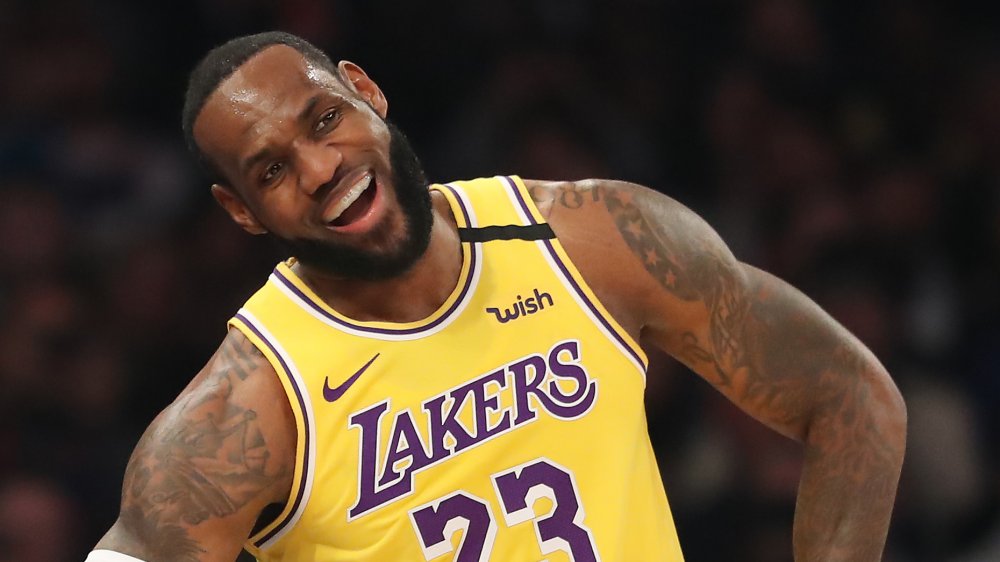Did These Athletes Sell Their Souls For A Paycheck?
Pro sports careers are usually pretty short, which means that athletes often look for other ways to make money. But sometimes they totally surprise us by choosing to do the complete opposite of what we expect from them, based on their public image and choice in career.
Today, we're looking at athletes who chose to increase their income in ways that may have compromised their reputation. From unhealthy product endorsements — a 2013 Pediatrics study found that a whopping 79 percent of the food and beverage brands endorsed by the top 100 most influential athletes in 2010 were "energy-dense and nutrient-poor" — to illegal side hustles, unlikely friendships with infamous dictators, and more, these sports stars went the extra mile to get even richer.
Whether or not they ended up looking foolish or even shady in the end, the real question is: Did these athletes actually sell their souls for a paycheck? Because when you set aside your values to make a deal worth upwards of seven figures, it can certainly seem like it. But we're not here to be the judge. We'll leave it up to you to decide as we take a look at these surprising stories of famous sports figures who up-leveled their salaries with lucrative deals.
LeBron James quit the Cavs for an irresistible payday ... twice
The Cleveland Cavaliers, one of the worst-ranked NBA teams in 2003, made their smartest move when they drafted the superstar-to-be LeBron James. James was an Ohio native — making it even more meaningful for Cavaliers fans. But after playing in Cleveland for seven years (even taking them to the finals in 2007), James decided to ditch his home state and join the Miami Heat for a contract worth about $110 million.
Obviously, money talks ... but the way James announced his departure was controversial. He sat down with ESPN for a live televised event called "The Decision," which lasted no less than 75 minutes and ended with him saying he was "taking [his] talents to South Beach." Heartbroken fans burned his jerseys, and NBA commissioner David Stern said that while "[James'] performance was fine," the TV special was "ill-conceived." Dan Gilbert, the owner of the Cavaliers, called it "narcissistic," and the announcement special was criticized by many others for being in bad taste.
James later returned to Cleveland in 2014, however ... only to leave once again in 2018 for a $153 million contract with the Lakers (via NBC News). Before he took his big payday, though, he did leave the Cavaliers with a pretty sweet parting gift — their first NBA title ever in 2016.
Shaquille O'Neal joined Papa John's following major controversy
Larger-than-life NBA star Shaquille O'Neal's made some eyebrow-raising choices when it comes to his career outside basketball. (Anyone remember Shaq-Fu or Kazaam?) So when the former Laker announced he was joining the board of directors for Papa John's Pizza in 2019, it wouldn't have been that surprising — that is, if the company's founder, John Schnatter, hadn't been ousted for using the N-word on a conference call the year before.
Still, O'Neal committed to the deal, not just as a board member but as an investor too, telling USA Today, "I plan to purchase as many (locations) as I can. Everyone loves pizza and pizza loves everyone." He also stepped forward as the face of the brand on nine of the restaurant's locations by putting "SHAQ" in their phone numbers and showcasing his footprints in their marketing.
Interestingly, while O'Neal has helped Papa John's rebuild its public image, another athlete — former NFL player Peyton Manning — dumped his franchise ownership just days before the 2018 scandal hit the fan. However, as O'Neal explained his decision to The Undefeated, "[I told CEO Steve Ritchie] the only way I would want to be involved is if you got some diversity in your leadership." Calling Schnatter's workplace controversies "uncalled-for and unacceptable," Shaq added, "I want to be the one to help cultivate a new culture where everyone knows they are loved and respected."
Dennis Rodman and his sponsored trips to North Korea
Many of us were confused to see ex-NBA star Dennis Rodman buddying up with North Korean dictator Kim Jong Un. When he went the first time with three Harlem Globetrotters in 2013 (for a Vice documentary on basketball diplomacy), it was a bit strange. But then he went back to visit the notorious Supreme Leader a total of five times in four years — even trying to broker the release of an American hostage — all while insisting he's "not there to be an ambassador."
We'll probably never know for sure why he had this sudden affinity with Kim, but maybe it makes a little more sense when you consider that Rodman's North Korean trips were sponsored — including by one company that sells marijuana cryptocurrency. The money had to have helped Rodman, especially since the athlete's post-NBA years haven't been kind to him financially. After a $27 million total payout from the league, the rebound legend is now said to be worth just $500,000 following a child support lawsuit worth over $800,000 and bad tips from his financial advisor.
"I just give players advice like this: if you build yourself up to go and play a game that you love to play ... What is left for you to achieve?" Rodman told Business Insider while opening up about his financial situation in 2019. "You got the main thing you want: money ... 'I want to stay rich.' Okay, great. Don't we all?"
Pete Rose bet on his own team
It seems as though being the highest-paid baseball player in the '70s wasn't quite enough for Pete Rose, whose gambling habit may have been too tempting. In his 2004 autobiography, he admitted to betting on his own team, the Cincinnati Reds, while managing them. But while he was straightforward about his mistake, Rose wasn't too apologetic about it.
"I'm sure that I'm supposed to act all sorry or sad or guilty now that I've accepted that I've done something wrong,” Rose wrote in the epilogue (via The New York Times). ”But you see, I'm just not built that way. Sure, there's probably some real emotion buried somewhere deep inside. And maybe I'd be a better person if I let that side of my personality come out. But it just doesn't surface too often. So let's leave it like this ... I'm sorry it happened, and I'm sorry for all the people, fans and family that it hurt. Let's move on."
Sadly, the extra cash he got probably wasn't worth the fallout. Despite his achievements in the MLB, Rose was banned for life from baseball in 1989 and was denied eligibility for the Hall of Fame, per History. During his career, Rose also made, well, an odd endorsement deal selling sugar water to kids. This borderline-psychedelic Kool Aid commercial that Rose did back in 1986 had some scratching their heads even years later.
Lance Armstrong made millions with the help of PEDs
Probably one of the most high-profile examples of a so-called "athlete sellout" is Lance Armstrong. The pro cyclist shocked the world when, as a seven-time Tour de France winner and well-known cancer research advocate, he retroactively tested positive for performance-enhancing drugs (PEDs), which he denied, in 2005. By that time, he had also made a crazy amount of money in his career — reportedly $125 million at its peak.
After he retired, a 2012 report by the United States Anti-Doping Agency (USADA) accused Armstrong of running an illegal doping program while he was a pro cyclist. From there, everything started tumbling down. He lost major sponsorships, including Nike and Anheuser-Busch, stepped down from his cancer nonprofit, Livestrong, and was stripped of his Tour de France titles. "All that money he earned, he actually cheated to get it," the wife of former cyclist Greg LeMond, Kathy LeMond, later told USA Today. "He didn't earn any of that honestly. It's all ill-gotten gains."
Amid the scandal, Armstrong also had to pay $20 million in damages for several court cases before he was hit with a $100 million fraud and conspiracy lawsuit by the federal government, which he later settled for $5 million, The Guardian reports. As the disgraced cyclist told Oprah Winfrey in 2013 (via The Telegraph), "I'll spend the rest of my life trying to earn back trust and apologize to people."
These may not be the best brands for Lewis Hamilton
International superstar race car driver Lewis Hamilton has been pretty vocal about his stance on environmental issues. In 2019, he posted on his Instagram Stories (via The Guardian): "Extinction of our race becoming more and more likely as we overuse our resources. The world is a messed up place. World leaders either uneducated or don't care about the environment at all."
But as the saying goes, he who lives in a glass house should not throw stones. Hamilton quickly received criticism for his comments, considering he still drives (and travels globally) for Formula One, which has a huge carbon footprint — and even signed a two-year $100 million contract extension with Mercedes in 2018. "We all know the lifestyle that Lewis has," rival Fernando Alonso told Spanish radio station Cope, "and that Formula One drivers take 200 planes a year." In response, Hamilton claimed to reporters that his team aimed to become "carbon neutral" (via CNN): "It's not the easiest because ... we are racing Formula One cars. Our carbon footprint, for sure, is higher than the average homeowner who lives in the same city. But that doesn't mean you should be afraid to speak out about things that can be for a positive change."
Finally, there's the matter of Monster Energy. Hamilton previously inked a massive deal to create a signature drink with the company, but it's no secret some energy beverages have been linked to "potentially harmful" side-effects.
Reggie Bush was illegally 'paid' in college
When ex-NFL football player Reggie Bush was originally drafted into the league, he came with a lot of hype. Yet while some criticized him for not living up to expectations at first, no one was expecting what happened just months after he joined the New Orleans Saints.
In September 2006, Bush was exposed for receiving illegal gifts from sports marketers as a college player (such as hotel stays and a home for his family rent-free). While the question of whether or not college athletes should be compensated remains a hot button issue, gifts or payments of any kind are still against the National Collegiate Athletic Association's rules. University of Southern California football coach Pete Carroll claimed the school "didn't know" about the residential situations violating the rules (via Time), but the acceptance of these gifts put a massive stain on Bush's pro career.
While Bush voluntarily forfeited his 2005 Heisman trophy afterward, he later publicly stated that he felt college players should be paid legitimately by the NCAA. "The universities are making so much money off the athletes," Bush told Business Insider in 2018. "They're selling your likeness. Selling your jerseys, bobbleheads, whatever else, blankets, whatever else they can sell, while you are there for those three or four years." He added, "The kids deserve more and they should be given more. They should at least be compensated. I don't know what the number is but it should be something."
Floyd Mayweather and Manny Pacquiao delivered so-so fight for maximum payday
In a long-awaited match-up that was later criticized for being over-hyped, boxer Manny Pacquiao lost to Floyd Mayweather Jr. in 2015 after landing far less than the 800 punches experts said would have been needed to win.
Some even believed that the two boxers delayed the fight in order to maximize the demand and raise their compensation for the event — and Mayweather practically confirmed this when after a reporter accused him of avoiding the Pacquiao fight until he had to give in to public pressure. "Why don't you just say I was smart?" Mayweather replied (via The New York Times). He added, "Five years ago, this was a $50 million fight for me, and it was a $20 million fight for him." Despite the two boxers' stellar reputations, sports news writers trashed the two for allegedly selling out the sport. "Boxing is dead and Mayweather-Pacquiao killed it," one reporter wrote for USA Today. "Never again will people shell out $100 million to watch two old men grab at each other for 36 minutes."
Nevertheless, Pacquiao drew $120 million for losing the fight, and Mayweather walked away with $180 million (via the Bleacher Report). And that's not to mention the extra $1 million Mayweather allegedly cashed in for selling a spot in his fight-day entourage to the Burger King mascot.
Magic Johnson's post-retirement ventures raised more than a few eyebrows
By the time of his 1991 retirement from the NBA, basketball legend Magic Johnson became known for many successful business deals — even though some were with fast food chains, like KFC and Burger King. Around that time, Entertainment Weekly claimed that while "Johnson reportedly collects as much as $12 million a year for endorsements," many of these deals were supposedly in jeopardy. While we can't say for certain whether this was true, it may shed some light on Johnson's next — and decidedly less successful — endeavor as a talk show host.
The athlete-turned-businessman's nighttime talk show, The Magic Hour, started airing just two years after he officially left the league. However, The Hollywood Reporter called Johnson's surprising TV stint "brief and awkward." While fans were used to seeing Johnson dominate on the basketball court for the Lakers, the talk show, which was unfortunately taken off the air within three months, exposed his weaknesses when it came to TV presenting. Despite what we can only assume was a large paycheck, the embarrassment might not have been worth it ... but the clips are pretty priceless.
Since then, Johnson's continued to grow his lucrative empire by investing ownership in countless companies, at one point owning 31 Burger King restaurants. However, he seems to have changed course in recent years by becoming an official spokesperson for Obamacare.
LeBron James endorsed McDonald's for millions
We know what you're thinking: an athlete who needs to maintain a healthy body might be more mindful about endorsing fast food. However, that didn't stop a young LeBron James from taking a McDonald's endorsement in 2010.
The basketball legend later made a hilarious slip-up in a 2015 press interview, which cast the Golden Arches in a not-so-great light. After a reporter asked at what age he started caring about his body and staying fit, he responded, "Twenty-four. I ate McDonald's my first couple of years in the NBA. I didn't stretch, I didn't ice. It didn't matter. I was 18, I could do whatever I wanted to." However, he was quick to recover when a reporter gently asked how often he eats McDonald's now. "Every day," he repeatedly quipped with a smile, adding, "I just had it this morning. A good egg-and-sausage McMuffin."
While James "walked away from $15 million in endorsement money" from McDonald's in 2017, it wasn't because he suddenly had second thoughts about endorsing fast food. Instead, he jumped over to Blaze Pizza. "The numbers that you were showing me," James said in an Uninterrupted "Kneading Dough" interview with his business manager, "the numbers that we could make if we just put the time in effort into it, would be exceeding what McDonald's would be giving me guaranteed over the next four years."
Well, at the very least, it sounds like the deal made solid business sense.

